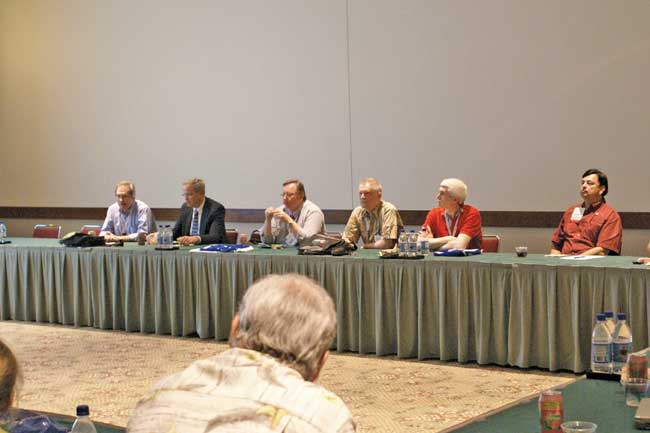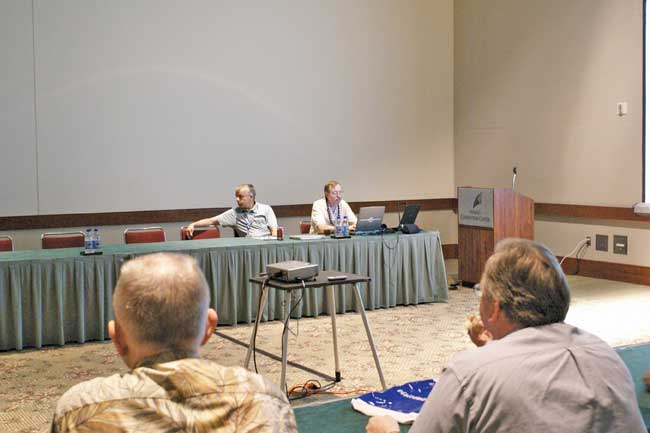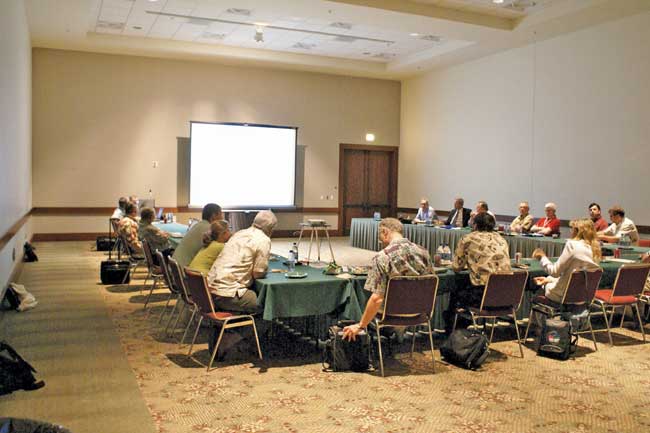The annual joint meeting of the Standards Advisory
and Coordination Committee (SACCom) and Representative Advisory
Committee (RAC) was held on Monday, July 9 during a luncheon meeting
at the Hawaii Convention Center in Honolulu, Hawaii. David Guzman,
the SACCom Chair and Fred Heather, the RAC Chair, co-chaired the
meeting. David Guzman opened the meeting with a overview of the
SACCom including a review of its scope, representative positions,
search for Vice-Chair and Secretary of SACCom and plans for 2008.
Plans are underway for a web-based tool for the inputting of reports
and communication between members. Both SACCom and RAC are inviting
and recruiting additional representatives from other organizations
involved with EMC standards such as the FCC and FDA, etc., and
EMC processes. Opportunities are being sought for bi-directional
interactions with EMC Society presentations at liaison organizations.
The remainder of the meeting was a round the table brief by the
members of both committees on their respective group’s activities.
Some of the highlights were as follows.
American Institute of Aeronautics and Astronautics (AIAA) Committee
on Standards (CoS) S-121-200X, Electromagnetic Compatibility Requirements
for Space Equipment and Systems is sponsored by the United States
Air Force (USAF) Space and Missile Center (SMC). The committee
began with Aerospace Corporation report # TOR 2005 (8387)-1, Electromagnetic
Compatibility Requirements for Space Equipment and Systems. After
much debate and work, the committee voted to abandon the TOR and
began anew based upon MIL-STD-461 E and MIL-STD-464 requirements.
This effort has been mistakenly referred to as a “1541 B”
by some, but it is not a military standard, has no relationship
to the MIL-STD process, and is nothing like MIL-STD-1541 A (retired).
AIAA is facilitating the effort for SMC, and will publish the
final document.
 |
| The annual SACCom meeting held during
EMC 2007 drew the experts in the industry, including (from
left) Werner Schaefer of Cisco Systems, Steve Berger of TEM
Consulting, Andy Drozd of Andro Computational Solutions, Don
Heirman of Don HEIRMAN Consultants, Elya Joffe of KTM Project
Engineering, and Henry Benitez of ElectroMagnetic Investigations. |
 |
| Fred Heather (right) of the Navy,
Patuxent River, Maryland, prepares to commence the annual
joint meeting of the Representative Advisory Committee (RAC)
and Standards Advisory and Coordination Committee (SACCom)
in Hawaii along with Dave Guzman (left) of EMS PLUS, SACCom
Chair. |
 |
| The meeting room was full at the
annual SACCom/RAC meeting and luncheon held during the 2007
IEEE International Symposium on EMC. |
CISPR Subcommittee A, Subcommittee I and ANSI ASC C63™ activities
were reported by Don Heirman. CISPR Subcommittee A activities
include: testing in Full Anechoic Room-FAR, alternate test methods/sites,
effect of turntable material, antenna calibration, site validation/measurements
> 1 GHz, uncertainty due to test setup + > 1 GHz and use
of spectrum analyzers. The CISPR/TC 77 JTF Projects reported on
reverberation testing (61000-4-21), TEM testing (61000-4-20),
FAR testing (Pub 16-1-4 and 61000-4-22), and uniform test arrangements
for emissions already published in Pub 16-2-3. He also covered
CISPR I Multimedia Standards with CISPR 32 Emissions, which ultimately
replaces CISPR 13, CISPR 22 in 2008 at the earliest, CISPR 35
Immunity that ultimately replaces CISPR 20 and CISPR 24 due in
2009 at the earliest. The ANSI ASC C63™ activity reported
was test site acceptability above 1 GHz, immunity of office equipment,
wireless device testing, additional help in ESD testing, in-situ
medical device immunity testing, measurement uncertainty and EMC
of hearing aids with mobile phones.
ICES Organization (SCC39) was reported by representative Dave
Baron. Current activities include drafting a recommended practice
for low frequency measurement techniques, 0 – 100 kHz (IEEE
C95.3.1), IEEE C95.3–2002 (RF Measurement and Computation)
up for review, IEEE C95.6-2002 (Safety Levels 0 – 3 kHz)
up for review. IEEE C95.4-2002 (Safe Distance from Antennas During
Blasting Operations) up for review, and IEEE 1406 (Guide for Measurement
of Quasi-static Electric and Magnetic Fields) up for review [likely
will be combined with IEEE C95.3.1]. Their next meeting will be
November 28 – 30, 2007 in Irving, Texas at the Nokia Facility.
United States Technical Advisory Group ISO TC22/SC3/WG3 (Automotive
EMC – Immunity) was reported on by Chair Kin P. Moy. Current
activities involve the development of new test methods for components:
ISO 11452-11: “Radiated Immunity – Mode Tuned Reverberation
Chamber”, ISO 11452 –12: “Radiated Immunity
– Tubular Wave Guide” and coordinating activities
with two new working groups: WG 13 (Environmental Conditions)
and WG 14 (42 Volts Systems). They held their next meeting in
Sydney, Australia in September in conjunction with the CISPR meetings
there.
IEC 61326 EMC Product Family Standard for Measurement, Control
and Laboratory Equipment was reported on by TC66/SC65A Liaison,
Henry Benitez. IEC 61326 has changed from a single standard to
several parts. The general immunity requirements are updated to
parallel those in the generic immunity standard. The radiated
immunity requirements added between 1.4 and 2.7 GHz due to expanding
data services above 1 GHz (Wi-Fi, PCS/GSM mobile phones). The
new structure for IEC 61326 has Part 1 General Requirements, Part
2 Product Specific Requirements and Part 3 Immunity requirements
for equipment performing or intended to perform safety related
functions (functional safety) in industrial applications.
Both the SACCom and RAC will be collecting status reports from
the representatives and liaisons for the EMC Society Board of
Directors meetings. These reports will be shared in the EMC Newsletter
after their respective meetings. EMC
|
|
|
 2007
SACCom/RAC Luncheon and Annual Meeting
2007
SACCom/RAC Luncheon and Annual Meeting

